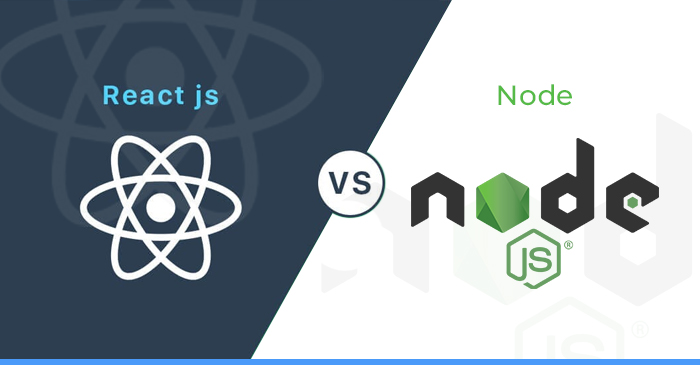
Node vs. React Technology
Although both Node.js and React.js are JavaScript technologies, they serve very different purposes. The primary distinction between Node.js vs. React.js is that the latter is used to create user interfaces, whereas Node.js is a back-end framework. But, each has positives and negatives, as well as specific applications.
Continue reading to learn which one to utilize for your upcoming JavaScript project. Below, we compare the main advantages and disadvantages of Node.js vs. React.js. After reading this article, you will understand what technology best meets your project’s demands.
What is Node.js?

Node.js is a technology for creating the back ends of JavaScript applications. The V8 JavaScript engine in Google Chrome powers Node.js. Node.js is efficient and small because it employs an event-driven, non-blocking I/O approach. Developers use this framework to host APIs, handle HTTP requests, and connect to databases.
Who Uses Node.js?
Node.js has gained popularity over the years thanks to its ability to handle large-scale, real-time applications and its ease of use. Node.js is used by a wide range of organizations and developers, from small startups to large corporations like Netflix, Walmart, and PayPal. It is also widely used by developers in the tech industry for building web applications, microservices, and APIs. Node.js is also popular in the gaming industry, used to build real-time multiplayer games.
What are the Features of Node.js vs. React.js?
Using JavaScript, Node.js is a cross-platform, open-source server-side runtime environment that enables developers to create scalable, fast online applications. Due to its many features and advantages, it has grown in popularity recently. Here are a few of Node.js’s main characteristics:
Event-driven and Non-blocking I/O:
Node.js is built on a non-blocking I/O model. It can handle many simultaneous connections with minimal overhead. It can handle I/O operations asynchronously, allowing it to scale and perform well under heavy loads.
JavaScript Everywhere:
Node.js allows developers to use the same language for client and server-side development. This makes sharing code between different parts of an application easier and improves productivity.
Easy Scalability:
Node.js is highly scalable due to its non-blocking I/O model and event-driven architecture. It can handle large amounts of data and is well-suited for building real-time, data-intensive applications.
NPM (Node Package Manager):
NPM is a powerful package manager that comes with Node.js. It allows developers to install, update, and manage third-party packages and modules easily.
Fast Execution:
Node.js is built on Google’s V8 JavaScript engine, known for its speed and performance. This allows Node.js to execute code quickly and efficiently.
Cross-Platform Compatibility:
Node.js is compatible with multiple platforms, including Windows, Mac, and Linux. This makes it easy to develop and deploy applications across different operating systems.
Server-Side Proxy:
Node.js can act as a server-side proxy, allowing it to handle requests from different sources and forward them to the appropriate back-end services. This makes it easy to build complex, distributed systems.
Community Support:
Node.js has a large and active community of developers contributing to its ongoing development and maintenance. This community provides developers with support, resources, and tools to use and improve Node.js.
Read more: Swift vs. Objective-C: A Comprehensive Comparison Guide
What is React.js?

An open-source front-end package called React.js allows for systematically developing user interfaces for websites and web apps. React.js is designed to make it possible to create dynamic libraries with excellent performance. For instance, while individuals are conversing, this technology is utilized to display newsfeeds. Angular and Vue.js are alternatives to React.js.
Who Uses React.js?
Facebook developed React.js, which has since gained popularity in the developer community for its flexibility and ease of use. React.js is used by many organizations, from small to large enterprises like Airbnb, Dropbox, and Instagram. It is also widely used by developers in the tech industry for building web applications, mobile apps, and even desktop applications. React.js is particularly popular in the e-commerce industry, where it is used to build high-performance, interactive user interfaces that can handle large amounts of data.
What are the Features of React.js vs. Node.js?
React.js, a popular JavaScript library, is used for building user interfaces. It was developed by Facebook and is known for its flexibility, ease of use, and performance. Below are the important features of React.js:
Virtual DOM:
React.js uses a virtual DOM (Document Object Model) to update the user interface. This allows it to optimize the rendering process and improve performance, especially when dealing with large and complex applications.
Component-Based Architecture:
React.js uses a component-based architecture, where UI elements are broken down into smaller, reusable components. This makes managing and maintaining the codebase easier and improves code reusability and readability.
JSX:
React.js uses a syntax called JSX, which allows developers to write HTML-like code in JavaScript. This makes creating and managing UI elements easier and improves code readability.
One-Way Data Binding:
React.js uses one-way data binding, meaning data flows only in one direction, from the parent to the child component. This makes it easier to manage data and prevent unexpected changes in the UI.
Reactive Updates:
React.js uses reactive updates, which means it automatically updates the user interface when there are changes in the data or state. This allows for a more responsive and interactive user experience.
Server-Side Rendering:
React.js supports server-side rendering, which allows the initial page load to be rendered on the server. This can improve the performance and SEO of the application.
Lightweight:
React.js is lightweight and fast, which makes it well-suited for building single-page applications that require high performance and responsiveness.
Large Community:
React.js has a large and active community of developers contributing to its ongoing development and maintenance. This community provides support, resources, and tools for developers to use and improve React.js.
Node.js vs. React.js: A Comparison
JavaScript developers may create scalable, high-performance web apps utilizing the server-side runtime environment Node.js. It is well-suited for building real-time, data-intensive applications and can handle many simultaneous connections with minimal overhead. Node.js is highly scalable and easy to deploy, making it a popular choice for building back-end services and APIs.
React.js, on the other hand, is a client-side library used for building user interfaces. It is highly flexible and allows developers to create reusable UI components for different parts of an application. React.js is known for its performance and can optimize the rendering process, especially when dealing with large and complex applications. It is well-suited for building complex, interactive user interfaces.
Node.js vs. React.js: Which One is Better?
In conclusion, Node.js is best suited for building server-side applications and back-end services, while React.js is best suited for building client-side applications and user interfaces. However, it is worth noting that the two technologies, node.js vs. react.js, can be used together in a full-stack JavaScript development stack, allowing developers to build scalable and performant web applications.
Read more: Python vs. Other Programming Languages: A Comprehensive Guide